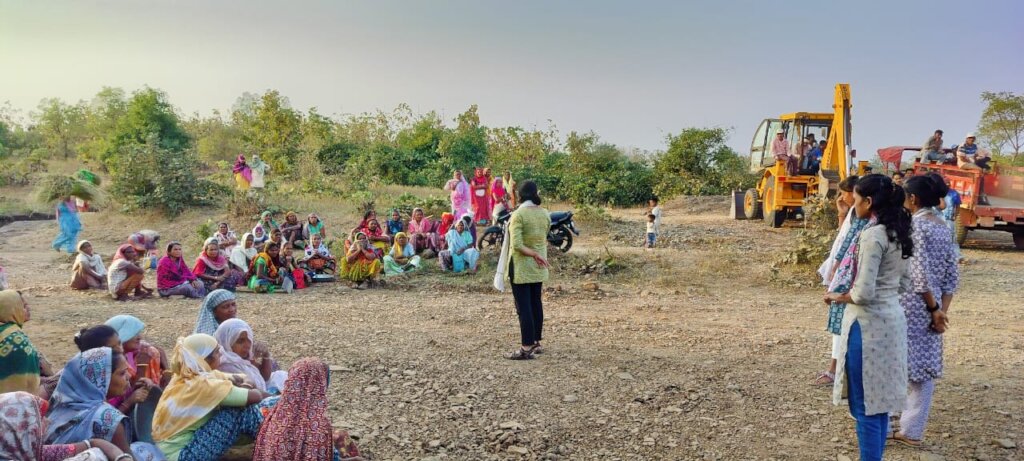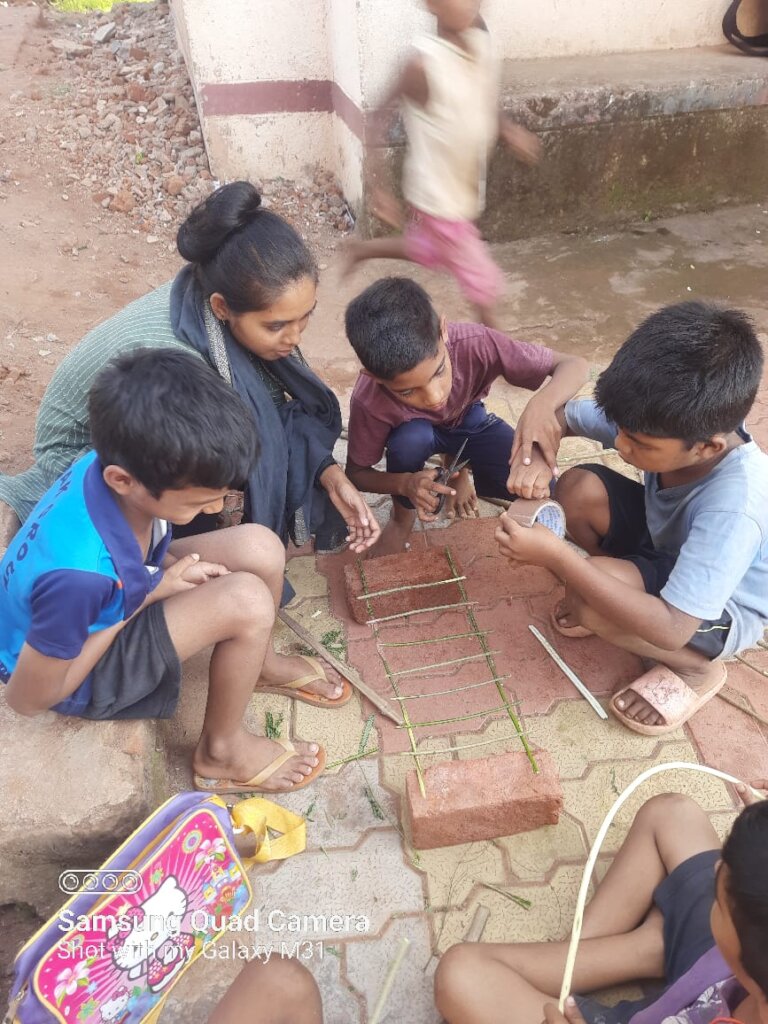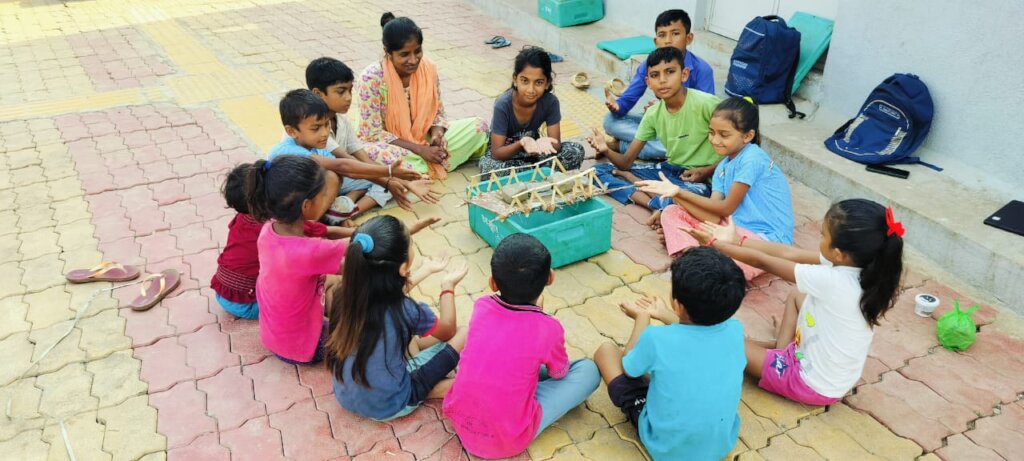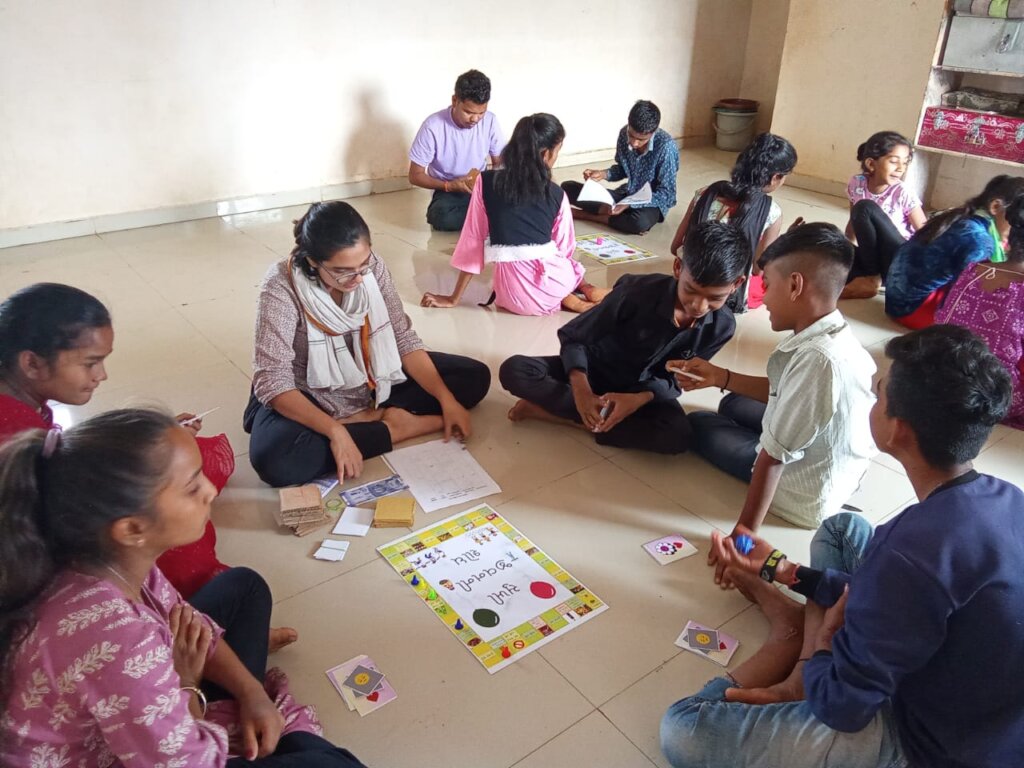By Lijimol | Program Organizer
LEADERSHIP CAMP
The month of November started with Residential Leadership camp. There were 66 children from 14 villages. The camp deeply discussed on the theme of Conscious Consumption; a special focus on the increased intake of Junk foods. This theme was chosen because of the increased intake of packet snacks and fries by children. They usually eat 5-6 packets of these kinds. The camp, through various group work, games, activities, made the children think about the food they are eating, how food is important especially for their age groupand where to get the essential nutrients for their physical health. An activity where they searched for each ingredient in the common packets was a hefty process, but in the end the children understood the effects of long term and repeated consumption of these items can create damage to their bodies.
A board game was also designed under this theme where children gained happy life and points when they eat healthy and incurs medical expenses and get sadness when they consume Junk foods and substances. The game to an extent made the seriousness of the issue easier for them to comprehend.
The effects of Alcohol and Gutkha (tobacco) on human body was also discussed in detail. These children's parents are highly addicted to one of these substances, and there has been increased incidences of children starting substance abuse from an early age.
The camp ended with children listing alternatives to the packet snacks. Most of the alternatives were locally sourced. The children in groups also made an Action plan that they will execute back in their villages. Their Action plan consisted of communicating with the local shopkeepers, their friends and switching slowly to healthy alternatives like peanuts, dals, jaggery snacks etc.
CHILD RIGHTS WEEK CELEBRATION
After the Diwali celebrations,in each village, the children, with the help of facilitator, also collected the empty snack packets littered in the village. Usually as there is no waste disposal mechanism these packets are burnt outside or in the kitchen for cooking purposes. Children collected these packets and did a calculation on how much these are worth. The survey was done over two days and four days depending on the size of the village. Later these figures were multiplied to get the expenditures annually. This was done by children, and this indeed was shocking for them.
During the Child rights week celebration over 14th November to 20th November, the project team did a street play on the Ill effects of Junk on Human Body at these villages. After each play, there were discussions with parents and audiences on the numberof packets that were collected in the village and how this money could be used productively for good health. We were able to communicate and reach 1313 children and parents of these and adjacent villages.
Children did an awareness rally around the village to sensitize the adults on the adverse effects of alcohol and other substance abuse. The slogans and posters were made by children which emphasized the importance of a healthy lifestyle. Children also visited the local shops and enquired on the frequency of stock refill of the common packet foods, the most demanded packets, and rewards that the manufactures give the shop owners for the increased sale.
Later the play was performed in schools after the Vacation. In the schools too, productive discussions took place under this theme with teachers.
Days after the Leadership camp, one of our field facilitators met a parent. He enquired what were our activities with children during the camp. Because his son has given him complete information on the ill effects of tobacco and asked him to stop. He was quite astonished but displayed a proud feeling about his son.
PROJECT BASED LEARNING
The children took up the project of building bridges in October. Children with the help of facilitators researched the topic and brainstormed on creating structures out of the locally available materials that can withstand a certain weight. They were successful in creating the same.
Another STEM project was to make a wrecking ball and then experiment with different heights and angles to figure out which one had the most force.
CELEBRATION OF FESTIVALS
The month of October was busy with preparations for the upcoming months. The month was also exciting for children as their most awaited Navaratri festivities were fast approaching. So garba (a form of community dance) was arranged by children in their villages.
A Vanbhojan with 66 children from three villages was also planned in Kunbar Eco Campsite. Children played together, made food, and ate together. They also played Garba and Timli (tribal dance) and had loads of fun.
BALDOST SAMITI MEETINGS
In the month of December, theHealthy eating habits was highlighted in all the Baldost Samiti meetings. The expenses calculated by children from collecting the empty packets in the villages were again shared with the parents. The parents acknowledged the seriousness of the issue and promised to take care of the food habits in their home. One parent cited that their children after coming from the camp had shared the effects of substanceabuse and junk food with them. Another parent recorded that they have seen a reduction in consumption.
Two parents’ meetings in both the villages of Samarpada and Pomelapada where we shared our activities in detail and explained our approach. Winter season is one of the busy crop seasons making it hard for the parents toattendthe meeting. We resolved this by doing Mohalla(a part of a village) meetings. We started going to different Mohalla in the village and gather the parents there, this way field facilitators were able to gather more parents, especially mothers in a more effective way.
ONE DAY TRAININGS
One Day training wasfacilitated on the theme of Understanding Emotions and taking care of our mental health.
During the month of October, on Mental Health Awareness Day, we facilitated one-daytraining on this theme of Mental Health with older children. We designed several individualand group activities. These activities range from being aware of our own emotions to givingself-affirmations, expressing gratitude to self and others, etc. One of the activities was towrite diary/journal based on the prompts.To encourage this healthy habit, we followed up with this activity for a month. Wheneverchildren came to Vanshala, we took out 15 minutes’ time for them to write diary. Some of theolder girls have picked up this habit and try to write daily.
BALMELA
Balmelasare fun learning methodology to engage children with certain topics while having fun and learn by doing using principle of experiential education. Balmelas on the theme of arts, making science toys and crafts were organized during the months of October, November, and December. The Balmelas were organized for younger children. Some of the older children participated to help the younger children.
FOCUSED GROUP DISCUSSION
An intensive Focussed group discussions was done with children, parents, teachers in 14 villages to get feedback, suggestions on the past activities done with children. The exercise primarily focused on capturing the changes that parents and teachers witnessed among the children because of the play way method. Responses of children regarding their satisfaction with activities, their interest areas, their most liked and disliked activities were also recorded. Interestingly and unsurprisingly the teachers and parents demanded more activities that focused on academics, while the children demanded more activities that are creative, science experiments, crafts, and play.
AASHRAMSHALAS
There has been a focus on leadership games, life skills, science experiments and activities in the Aashramshalas during the reporting period. From the beginning of 2024, we have reduced our staff size. We are currently in a phase of strategizing and bringing clarity to our approach. From January we had stopped our activities in villages and began to solely engage with Aashramshala children. While team building games, activities to recognize emotions and constructively manage draining emotions through music and art were done with bigger kids, paper crafts and paintingwere adopted to engage with smaller children. During this time, we are simultaneously making plans for the coming financial year and how to create a stronger and intensive engagement with the most vulnerable children.
Project reports on GlobalGiving are posted directly to globalgiving.org by Project Leaders as they are completed, generally every 3-4 months. To protect the integrity of these documents, GlobalGiving does not alter them; therefore you may find some language or formatting issues.
If you donate to this project or have donated to this project, you can receive an email when this project posts a report. You can also subscribe for reports without donating.
Support this important cause by creating a personalized fundraising page.
Start a Fundraiser


